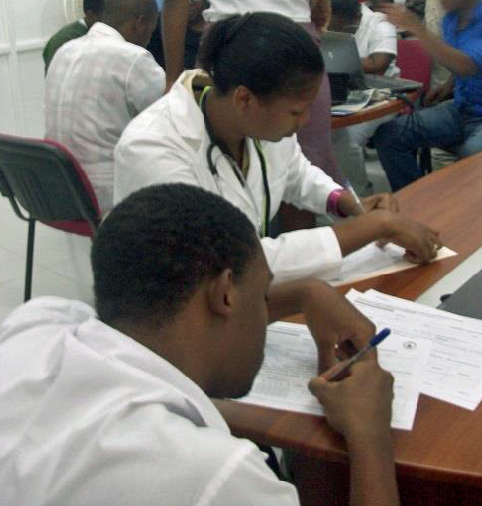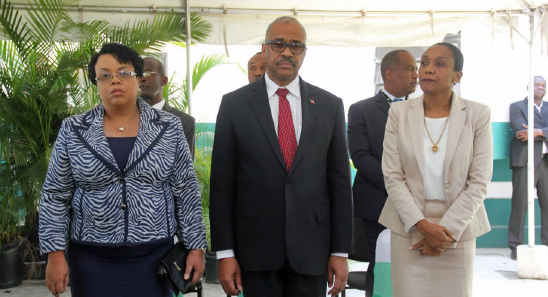Haiti Health Workforce Data Audits Lead to Human Resources for Health Improvements
Categories: Announcements, Where We Work
Haiti is one of five countries in the Americas facing a severe shortage of health workers including doctors, nurses, and midwives. With only 0.65 doctors, nurses, and midwives per 1,000 people[i], Haiti falls well below the World Health Organization’s recommendation of 4.45 doctors, nurses and midwives per 1,000 people to achieve the Sustainable Development Goals. The nation of over 10.9 million people[ii] has approximately 15,660 health workers of all cadres: 8,469 personnel in the public health sector—of whom approximately 88 percent are concentrated in urban areas[iii]—and 7,191 in the private health sector[iv].
Until now, incomplete and out-of-date health workforce data has made it difficult for Haiti’s Ministry of Health (MSPP) to address this challenge. The last known census of the health workforce occurred in 2008, before the 2010 earthquake that devastated Haiti’s already fragile public health infrastructure. Without reliable health workforce data, the MSPP’s Directorate of Human Resources (DRH) could not develop an evidence-based strategy to address the lack of qualified health professionals nationwide and thereby improve the Haitian population’s access to quality health services.
Updating Haiti’s Health Worker Data

MSPP health professionals completing the ERHIS-1 questionnaire at Hôpital Immaculé Conception des Cayes, a public hospital in Haiti’s Southern region.
To overcome this challenge, the USAID Health Finance and Governance (HFG) project has worked directly with the MSPP’s DRH since 2013 on a phased approach to collect up-to-date data on the current Haitian health workforce, strengthen health workforce information and management systems, and develop the country’s first comprehensive human resources for health (HRH) strategy.
As a first step, HFG and the DRH partnered to conduct nationwide facility-level surveys of health workers in the public sector—an activity called the Evaluation of Human Resources of Public Health Institutions (ERHIS-1)—and the private sector—the Evaluation of Human Resources of Private Health Institutions (ERHIS-2). The ERHIS audits compiled information such as type of provider, location, and professional qualifications, to paint a clear picture of the availability of quality health services in Haiti. HFG has since supported the DRH’s quarterly quality assessments of HRH data, with the DRH staff now taking full ownership of the regular data review process. This outcome is important for the future of HRH planning in Haiti: DRH ownership of health workforce data collection and quality review means that the MSPP now has the independent capacity to accurately understand and plan for Haiti’s health workforce composition, a capacity that did not exist before this partnership with HFG.
Putting the Data Audit Findings into Action
The ERHIS-1 and ERHIS-2- findings have allowed the MSPP to better identify and address workforce gaps. Findings from the ERHIS-1 led the MSPP to remove 670 “ghost workers”—individuals receiving regular paychecks from the MSPP but no longer actually employed there. Not only does this improve the accuracy of Haitian health worker data, but removing ghost workers from payroll frees up some of the MSPP’s personnel budget. The MSPP now has the capacity to routinely identify and eliminate ghost workers from its payroll, generating an estimated annual cost savings of $500,000. With the cost savings, the DRH plans to advocate for use of these funds to employ additional health workers.
The DRH is also using the ERHIS-1 data to monitor and address actual employee attendance at work, another challenge in Haiti that impacts the population’s access to quality health services. HFG and the DRH have established an attendance sheet system in each MSPP directorate to report and monitor employee presence, and address absenteeism on a quarterly basis. This will reinforce the identification of ghost workers, further strengthening the DRH’s advocacy for new employee recruitment and the retention of well-performing employees.
One of the main findings of the ERHIS-2 was the identification of over 1,000 private health facilities previously unknown to the MSPP. This knowledge will allow the MSPP to better coordinate and partner with the private health sector to increase access to quality care. The findings and recommendations from both audits will inform Haiti’s HRH strategy.
Focusing on HRH Strategy as Foundation to Improving Haitians’ Access to Quality Care
The ongoing HFG and MSPP partnership on the ERHIS data audits translates to a better understanding of Haiti’s health workforce needs, and the empowerment of its Ministry of Health and the public sector human resources directorate tasked with addressing those needs. Ultimately, the partnership will lead to more opportunities to improve access to quality health services through strategies aimed at both the public and private health sectors.

Dr. Greta Roy Clément, Minister of Health, Dr. Jack Guy Lafontant, Prime Minister of Haiti, and Dr. Daphnée Benoit Delsoin, outgoing Minister of Health, at Dr. Clément’s inauguration ceremony, March 22, 2017.
On March 22, 2017, the Government of Haiti appointed Dr. Marie Greta Roy Clément as Minister of Health. During her inauguration speech, Dr. Clément remarked: “It is imperative to address the recurrent problems with the administration and management faced by public hospitals, while equipping them with the human resources and materials that can maximize the health services offered in alignment with the demand of different sectors of national life.” The EHRIS efforts and HRH strategy will play an important role in advancing this vision. HFG will support the MSPP in formally launching a multi-sectoral committee to develop Haiti’s HRH strategy in late 2017.
[i] HFG ERHIS-1 & HFG EHRIS 2
[ii] Estimation IHSI 2015
[iii] HFG ERHIS-1
[iv] HFG ERHIS-2 & MSPP DRH SIGRH, June 2016
Download in PDF



